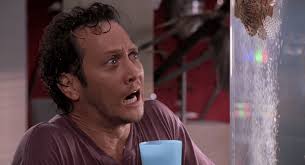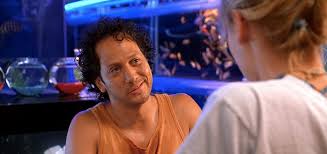Deuce Bigalow: Male Gigolo (1999)

Deuce Bigalow: Male Gigolo (1999) – A Raunchy Comedy with an Unlikely Hero
Introduction: A Quirky Comedy That Found Its Audience
Released in 1999, Deuce Bigalow: Male Gigolo is a comedy that doesn’t take itself too seriously. Starring Rob Schneider in his first major leading role, the film delivers an over-the-top, often crude but ultimately good-natured story about an underdog finding his way in an unconventional profession. Directed by Mike Mitchell and produced by Adam Sandler’s Happy Madison Productions, this film leans heavily into slapstick humor, absurd situations, and an abundance of one-liners that have become cult favorites over time.
Despite receiving largely negative reviews from critics upon its release, Deuce Bigalow managed to find an audience, particularly among fans of lowbrow, outrageous humor. Over the years, it has developed a cult following, and its influence is evident in the wave of similar comedies that followed.
In this in-depth review, we’ll examine the film’s plot, its comedic strengths (and weaknesses), performances, and why it continues to be a guilty pleasure for many.
The Plot: An Unlikely Journey into the World of “Man-Whoring”
At its core, Deuce Bigalow: Male Gigolo is a classic underdog story—albeit with a rather unconventional twist. Deuce Bigalow (Rob Schneider) is a well-meaning but socially awkward fish tank cleaner who stumbles into an unexpected career as a “man-whore” (or male gigolo).
After accidentally wrecking the luxurious apartment of Antoine Laconte (Oded Fehr), a wealthy, high-class gigolo, Deuce is forced to find a way to make money to pay for the damages. The only solution? He takes over Antoine’s job, entertaining a series of eccentric female clients.
Throughout his misadventures, Deuce meets an array of unconventional women—including a narcoleptic date, a towering giantess, and a woman with Tourette’s syndrome. Despite the film’s often crude humor, it attempts (though sometimes unsuccessfully) to present these women as more than just punchlines, with Deuce genuinely connecting with them beyond their quirks.
Meanwhile, Detective Chuck Fowler (William Forsythe) is hot on Deuce’s trail, determined to take down the so-called “man-whore” operation. As the story unfolds, Deuce finds himself falling for Kate (Arija Bareikis), a woman with her own secrets, while trying to navigate his ridiculous new career.
The film’s absurdity is its main selling point, and while it doesn’t pretend to be anything profound, it embraces its ridiculous premise wholeheartedly.
Rob Schneider’s Performance: A Lovable Underdog
Rob Schneider, best known at the time for his supporting roles on Saturday Night Live and his collaborations with Adam Sandler, takes center stage in Deuce Bigalow, showcasing his brand of physical comedy and exaggerated expressions.
As Deuce, Schneider plays a character who is clueless but kind-hearted. Unlike traditional gigolo characters who exude confidence and charm, Deuce is a bumbling everyman with no experience in seduction. This contrast is what makes the film’s humor work—he’s completely out of place in the world of high-class escorts, yet he somehow manages to succeed through his genuine personality.
Schneider’s comedic timing is his biggest asset here. Whether he’s fumbling through awkward dates or reacting to the increasingly bizarre situations he finds himself in, his performance is what keeps the film afloat.
While his style of humor is polarizing—either you find it hilarious, or you find it grating—there’s no denying that Deuce Bigalow plays to his strengths.
Supporting Cast: The Oddballs and Standouts
A comedy like this relies heavily on its supporting characters, and Deuce Bigalow certainly delivers on that front.
- Oded Fehr as Antoine Laconte – The suave and intimidating original gigolo, whose presence adds a level of absurd contrast to Deuce’s awkwardness.
- William Forsythe as Detective Fowler – His exaggerated tough-guy persona becomes increasingly unhinged as he tries to expose Deuce, providing some of the film’s funniest moments.
- Arija Bareikis as Kate – As Deuce’s love interest, she brings a bit of warmth to the film, balancing out the crudeness with a more grounded performance.
- The Women Deuce Dates – A mix of absurd caricatures and surprisingly sweet moments, these characters provide many of the film’s comedic set pieces.
Though many of these roles are exaggerated for comedic effect, the film does attempt to give them moments of sincerity, making Deuce’s relationships with them feel slightly more meaningful than expected.
The Humor: Slapstick, Gross-Out Gags, and Outrageous Situations
The humor in Deuce Bigalow: Male Gigolo is exactly what you’d expect from a late-90s Happy Madison comedy—silly, crude, and often ridiculous. The jokes range from physical slapstick (such as Deuce’s many disastrous attempts at “gigolo” work) to exaggerated gross-out humor (such as an unfortunate toilet incident).
Notable Comedic Moments:
- Deuce’s First Gigolo Experience – His clients turn out to be far from the glamorous fantasies he imagined, leading to hilariously awkward dates.
- The Tourette’s Date Scene – While controversial by today’s standards, this scene remains one of the film’s most memorable, showcasing Deuce’s ability to see beyond surface quirks.
- Antoine’s Return – His increasing frustration with Deuce’s antics adds an extra layer of humor.
- Detective Fowler’s Obsession – His irrational hatred of gigolos becomes increasingly absurd, culminating in ridiculous confrontations.
For fans of lowbrow humor, the film delivers plenty of laugh-out-loud moments. However, for those who prefer more sophisticated or nuanced comedy, Deuce Bigalow might feel like a barrage of juvenile jokes.
Cultural Impact: A Guilty Pleasure That Won Over Audiences
Despite being critically panned (with a 22% rating on Rotten Tomatoes), Deuce Bigalow: Male Gigolo performed well at the box office, grossing over $92 million worldwide on a modest $17 million budget. The film’s success even led to a sequel, Deuce Bigalow: European Gigolo (2005), which doubled down on the absurdity but failed to recapture the charm of the original.
The film’s humor is undeniably dated, with several jokes that wouldn’t hold up in today’s more sensitive comedic landscape. However, it remains a nostalgic favorite for those who grew up with late-90s comedies.
In many ways, Deuce Bigalow helped cement Rob Schneider’s status as a comedy star, leading to a string of similar films (The Animal, The Hot Chick) that followed the same formula.
Final Verdict: Should You Watch It?
Pros:
✔️ Hilarious in a dumb-but-fun way
✔️ Rob Schneider’s comedic timing works for the role
✔️ Some surprisingly sweet moments amidst the raunchiness
✔️ A nostalgic throwback to 90s comedy
Cons:
❌ Humor can be too crude for some viewers
❌ Dated jokes that wouldn’t fly today
❌ Thin plot with predictable story beats
If you’re a fan of Happy Madison-style comedies or enjoy dumb-but-entertaining humor, Deuce Bigalow: Male Gigolo is a fun guilty pleasure. It’s not a masterpiece by any means, but it embraces its absurdity and delivers plenty of laughs.
For those seeking deeper storytelling or refined humor, this film probably won’t make the cut. But if you’re in the mood for a mindless comedy filled with ridiculous situations and over-the-top performances, Deuce Bigalow is worth a watch.
Final Rating: ⭐⭐⭐ (3/5)
While Deuce Bigalow: Male Gigolo isn’t a cinematic masterpiece, it has enough charm, humor, and outrageous moments to make it a fun, nostalgic comedy that still finds an audience today.